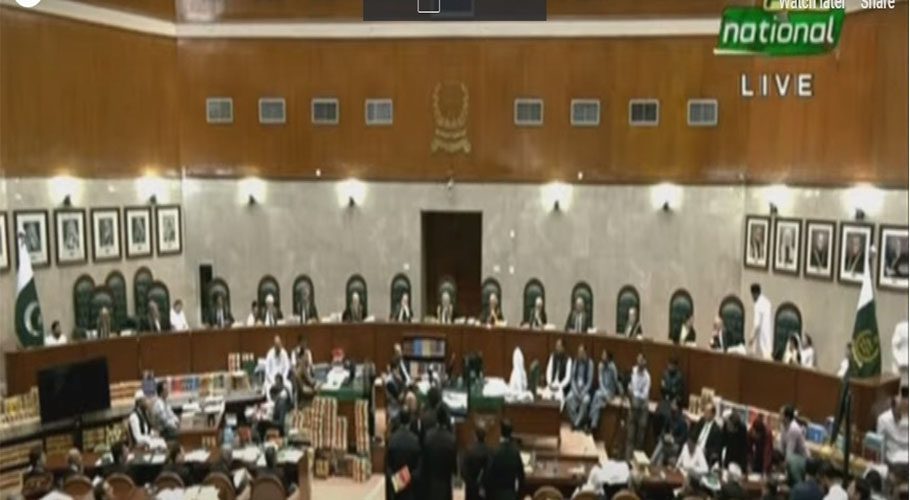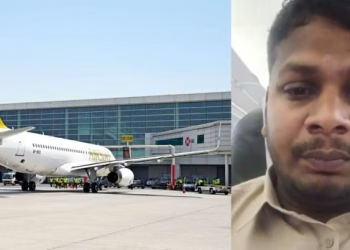Islamabad: The Supreme Court of Pakistan on Monday adjourned the hearing of the petitions challenging the Supreme Court Practice and Procedure Act 2023 till the third of the next month.
Supreme Court lawsuits opposing the Supreme Court Practice and Procedure Act 2023 are being heard by the Supreme Court’s full court, which is presided over by Chief Justice of Pakistan Justice Qazi Faez Isa.
It was the first time in the history of the country that live broadcasts of judicial hearings had been made available.
According to the Supreme Court Practice and Procedure Act, a suo-motu notice shall be decided upon by a three-member bench consisting of the Chief Justice and the two senior-most judges of the Supreme Court. Previously, the Chief Justice alone had this authority.
Chief Justice while passing remarks during the hearing today observed that parliament’s SC (Practice and Procedure) Act 2023 was not an attempt to clip the top judge’s rights by devolving the suo motu powers to a three-member committee.
The historic hearing, which was held almost throughout the day, has been adjourned till October 3.
During the hearing, CJP Isa said arguments in the case will begin afresh because the new bench has been formed.
There were three applications to make a full court, which had been approved, CJP Isa observed.
Ahead of the hearing today, the Attorney General for Pakistan (AGP) Mansoor Usman Awan submitted the federal government’s response in the matter, requesting the court to reject the petitions against the Supreme Court Practice and Procedure Act.
“Petitions against acts of parliament are inadmissible. [Therefore,] the petitions against the Practice and Procedure Act should be dismissed,” the response submitted by the government contended.
The full court was constituted by newly-appointed Chief Justice of Pakistan Qazi Faez Isa and includes Justice Sardar Tariq Masood, Justice Ijazul Ahsan, Justice Syed Mansoor Ali Shah, Justice Munib Akhtar, Justice Yahya Afridi, Justice Aminuddin Khan, Justice Sayyed Mazahar Ali Akbar Naqvi, Justice Jamal Khan Mandokhel, Justice Muhammad Ali Mazhar, Justice Ayesha A. Malik, Justice Athar Minallah, Justice Syed Hasan Azhar Rizvi, Justice Shahid Waheed and Justice Musarrat Hilali.
Prior to this, a full court meeting was held to consider live broadcasting of today’s proceedings and ponder over guidelines for effective hearing of cases. According to the sources, instructions for the live broadcast were issued yesterday (Sunday) — hours after Justice Isa took oath as the CJP.
Case history:
In April, an eight-member larger bench, headed by then chief justice Umar Ata Bandial had suspended the Practice and Procedure Act, even before its enactment. Since then, some apex court judges have been saying that the case should be decided at the earliest, because of its wide-ranging impact.
The Supreme Court Practice and Procedure Act has several objectives, including granting the authority to take suo motu notices and form apex court benches to a three-member committee, consisting of senior judges, including the chief justice. Currently, it is the sole authority of the chief justice.
The bill was passed by the National Assembly on March 29 and by the Senate on March 30. After which it was sent to President Dr Arif Alvi for his assent. However, Alvi refused to approve the bill and on April 8, he sent it back to parliament for reconsideration.
A joint session of parliament approved the bill as it was on April 10 and sent it back to the president for his approval. As per the law, any bill sent to the president for a second time would be enacted after 10 days even if the president did not sign it into law.
However, on April 13 – a week before its automatic enactment on April 20 – the Supreme Court stayed the enactment of the law. In the meanwhile, the National Assembly issued the notification of the bill becoming the law in the Gazette of Pakistan.
During the hearing of a case recently, Justice Mansoor Ali Shah stressed the need for a decision in the Practice and Procedure Act case at the earliest, saying that if the court declared the act valid, then all the judgments given under suo motu jurisdiction might lose their significance.
According to legal experts, the case, after taking rounds of parliament, the Presidency, and Courtroom No. 1, has now been placed before the entire Supreme Court, adding that the judgment in the case could impact the accountability law amendment case, the Supreme Court Review of Judgment and Orders case.
This is the first time in over eight years that a full court has been formed. Previously, the full court was formed in 2015 on the 21st Constitutional Amendment case, which was meant to establish military courts for the speedy trial of terrorists.
However, during these years, demands were made many a time for forming the full court to hear political cases and cases against parliamentary legalisation. However, the requests were declined as the concept of like-minded benches prevailed.
The legal experts also suggest that Chief Justice Qazi Faiz Isa had showed his seriousness about unifying the judiciary by forming the full court, as soon as he took oath of office. They added that now, all the judges would determine the fate of this legislation.





































